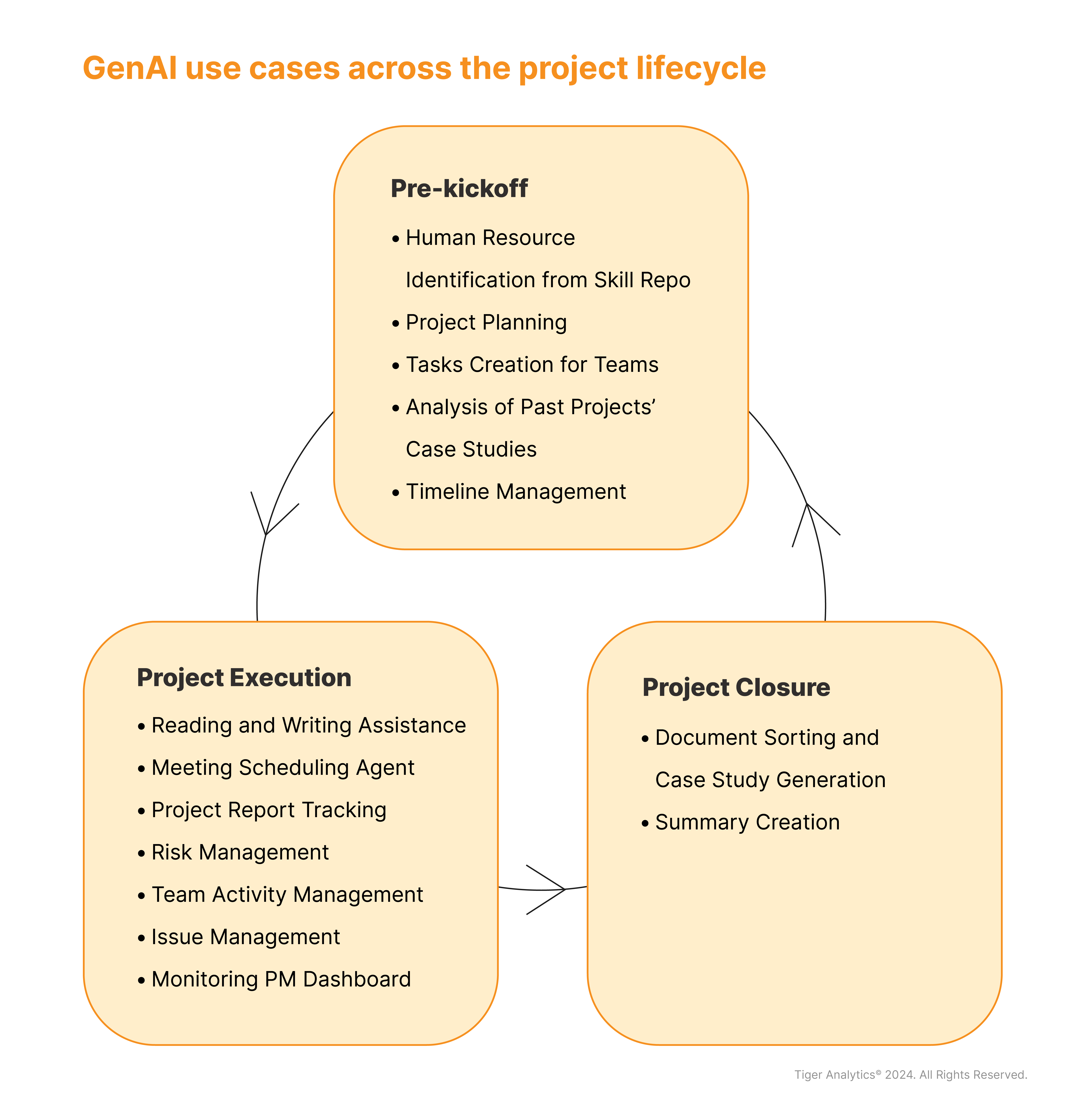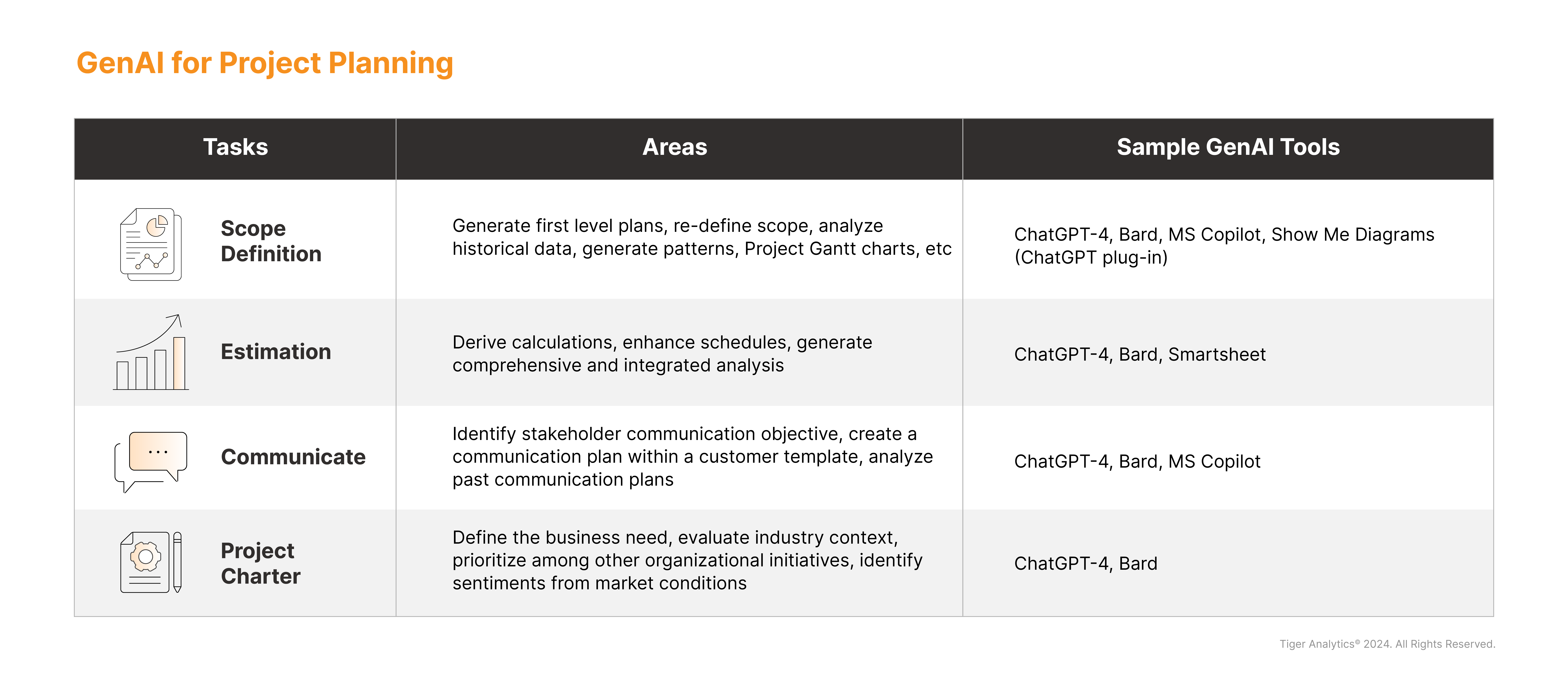Cardboard beds, Snoop Dogg and a delicious chocolate chip muffin vied for attention at the 2024 Paris Olympics where over 10,000 of the world’s best athletes competed for the gold. This edition was reportedly the cheapest in recent years – an estimated $9.7 billion, about 25% over the initial budget. In comparison, 2016’s Rio de Janeiro Games went 350% over its initial budget and 2021’s Tokyo Games 280%, an S&P Global Ratings report found. How did Paris achieve a leaner Olympics? Extensive use of existing infrastructure, and efficient project management with AI.
Generative AI can help ensure that large-scale projects such as the Olympics not only meet but exceed operational expectations while staying within budget. In our discussions with Fortune 100 clients, we at Tiger Analytics have observed a significant interest in GenAI adoption specifically for project management. Infusing GenAI in project management allowed for greater efficiency, and right decision-making, along with improved adherence to project timelines. Here, we explore specific areas where GenAI can be implemented and how project managers can make the most of it.
The GenAI Advantage in Project Management and Beyond
About 67% of AI decision-makers surveyed by Forrester’s May 2024 Artificial Intelligence Pulse Survey said their organization plans to increase investment in Generative AI in the coming year. The tech industry is at the forefront of GenAI adoption, followed by the banking, retail, industrial goods, and healthcare industries. Driving this adoption are the opportunities presented by GenAI, such as transforming customer engagement, boosting productivity, improving competitive agility, reducing tech debt, and optimizing workforces and supply chains.
However, in order for organizations to really reap benefits of GenAI, they must understand its strategic impact and make decisions that balance risk with the right business reward. It is also crucial that organizations prioritize ethical considerations, such as data privacy, transparency, and the potential for bias. Having worked with multiple clients on building and deploying projects, we’ve seen that GenAI has a direct impact on key challenges faced by project managers, such as scope creep, lack of communication, budgeting issues, inadequate resource management, and content creation.
While needs would vary depending on the industry, here are some industry-agnostic GenAI use cases for project management tasks.

A Guide to Integrating GenAI into Project Management
GenAI applications based on task complexity
GenAI can be initiated into project management across three broad complexity levels, ranging from fully automated tasks to advanced decision-making support. As discussed in an earlier article, adopting GenAI isn’t just about improving individual tasks; it equips employees with the tools to excel in their roles, driving greater overall workplace efficiency. Here’s how GenAI capabilities can be applied at each level:
1. Low Complexity Tasks – GenAI can handle repetitive, time-consuming activities that require very low human intervention, freeing PMs to focus on higher-level decision-making.
Examples:
- Obtain summary from customer Master Service Agreement (MSA) and Statement of Work (SOW) to understand specific clauses like penalty, volume discounts, contract to hire, agreed milestones/rate cards etc.
- Create summary from recordings of onsite meetings or meeting notes
- Create lessons learned summary after each release
- Create dashboards (from JIRA boards, efforts/ tasks management)
For instance, we collaborated with a global private equity firm to leverage GenAI capabilities like summarization and insights as part of setting up their Analytics Centre of Excellence (CoE). Adopting GenAI helped them enrich knowledge graph embeddings, enhance operational efficiency, and transform decision-making. Such capabilities can be extended to project management tasks as well.
2. Medium Complexity Tasks – At this level, GenAI complements the work of project managers with partial automation such as providing drafts, analyses, and data sets that PMs can expand upon. These tasks require human oversight, but benefit greatly from GenAI’s data processing power.
Examples:
- Large dataset analysis
- Risk analysis of past projects that are of similar nature
- Cost & schedule analysis and estimation
3. High Complexity Tasks – For complex, strategic tasks, GenAI enhances existing capabilities and supports the project manager’s experience and expertise. It can provide initial insights, while the PM’s judgment shapes final decisions.
Examples:
- Project scope management / business justification
- Project decision making
GenAI applications in the project management lifecycle
The project management lifecycle’s five distinct stages – Initiation, Planning, Execution, Monitoring & Controlling, and Closure – provide a systematic approach to a project. Leveraging GenAI across each stage helps project managers unlock new ways to optimize workflows and improve outcomes. Let’s explore how GenAI can be used in one stage of the lifecycle:

Final Note
GenAI’s impact across industries is undeniable with early adopters reporting quicker and greater returns on investment. It can simplify and enhance project management by improving project planning, task automation, effective resource allocation and risk management, etc. A significant sign of rapid GenAI adoption in this space is that most project management market tools now offer GenAI-based versions. For instance, Atlassian has developed multiple GenAI features as part of Atlassian Intelligence to help derive insights from JIRA data.
That said, it’s important to ensure that the use of GenAI aligns with the organization’s technical and ethical standards, as well as the values of the customer environment. Project managers should be cautious not to share customer-specific data, SOWs, MSAs, or project-related artifacts in public GenAI environments. Additionally, data privacy, security, potential biases, and the limitations of predictive models must be carefully managed. With the right oversight and expertise, project managers can leverage GenAI’s capabilities responsibly, ensuring its full potential is realized.
As GenAI continues to evolve, its applications in project management are also expected to expand and generate more opportunities to bring efficiency and success.





